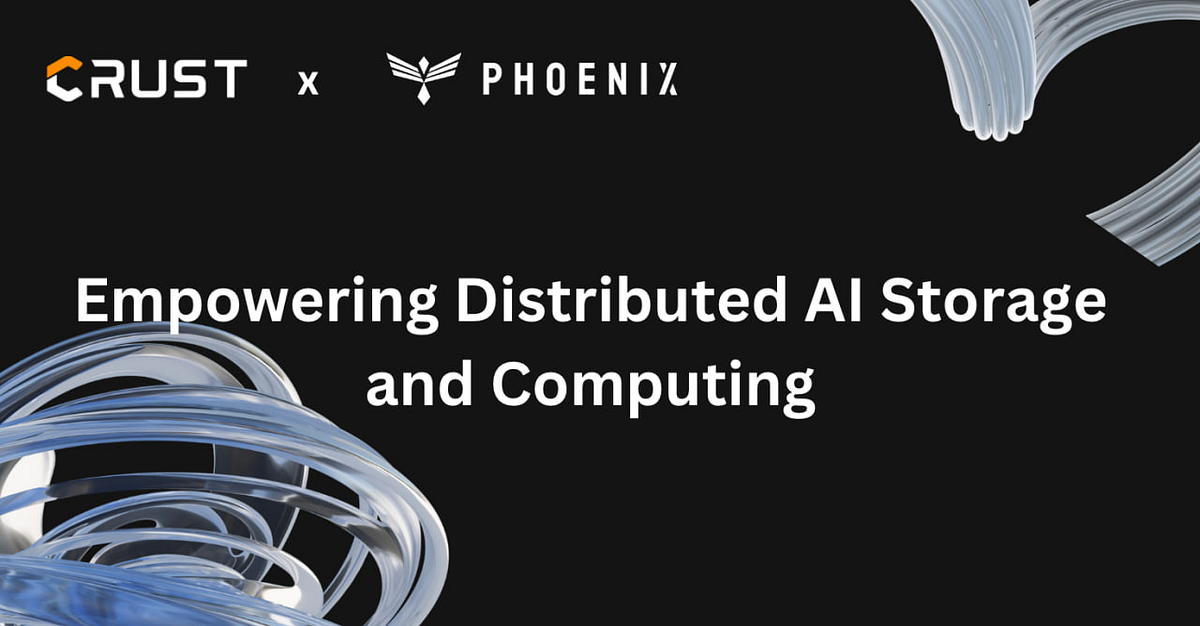Latest Phoenix News

a month ago
LBank Lists Phoenix (PXT): Bridging AI and Decentralized Infrastructure
On April 24, 2025, LBank Exchange announced the listing of Phoenix (PXT), a new digital asset designed to bridge the gap between Artificial Intelligence (AI) and decentralized physical infrastructure networks (DePIN). The PXT/USDT trading pair is now available, marking a significant step in the evolution of Web3. Phoenix aims to provide a modular and scalable framework for developing AI agents and intelligent applications directly on the blockchain, enhancing user interaction with digital assets and decentralized governance.
Phoenix's ecosystem is built on the principles of composability and accessibility, allowing developers and users to create autonomous agents and decentralized applications with minimal technical barriers. The integration of AI with DePIN transforms decentralized networks into programmable economies, enabling AI agents to engage in value creation and resource coordination autonomously. This innovative approach addresses critical limitations in the current Web3 landscape, such as cross-chain interoperability and the complexity of onboarding non-technical users, while enhancing the real-world utility of decentralized systems.
The native utility token, PXT, plays a vital role in the Phoenix ecosystem, facilitating economic interactions and incentivizing participation among developers, agents, and users. With a total supply of 21 billion PXT tokens, the distribution includes community incentives, ecological development funds, and allocations for team support and strategic partners. This tokenomics model not only fuels transactions and dApp operations but also fosters a sustainable DePIN economy, allowing for staking and cross-chain economic activities. Phoenix is poised to drive the next wave of adoption at the intersection of AI, DeFi, and digital infrastructure.

2 months ago
DeFi Protocols Showcase Remarkable TVL Growth in Recent Month
In the ever-evolving landscape of decentralized finance (DeFi), Total Value Locked (TVL) serves as a critical metric for assessing the growth of various protocols. Recent data from Phoenix Group has revealed significant TVL increases across several projects in the past month, attracting the attention of investors and crypto enthusiasts alike. Among the top 15 projects, BUIDL has emerged as the standout performer, showcasing a remarkable 219% growth in TVL, which now stands at $1.8 billion. This tokenized money market fund, powered by BlackRock and built on the Ethereum blockchain, has seen its value triple in just three weeks, reflecting a heightened demand for secure crypto assets.
Following BUIDL, Sonic (S) has secured the second position with a 171% increase in TVL, demonstrating the platform's growing influence since its rebranding from Fantom. Level Finance (LVL) comes in third with a 123% growth, attributed to its unique offerings in the DEX perpetual trading marketplace on the BNB Chain. Euler (EUL) and Sky (SKY) round out the top five, with TVL growths of 105% and 55.6%, respectively. Sky's recent rebranding from Maker to Sky has successfully attracted more users to its platform, further enhancing its market presence.
Other notable projects that have seen impressive TVL growth include DeepBook (DEEP) with a 53.8% increase, Idle Finance (IDLE) at 51.9%, and Beethoven X (BEETS) with a 47.9% rise. The data highlights a vibrant DeFi ecosystem, with projects like Orderly Network (ORDER) and Pell Network Token (PELL) also making significant strides. As the DeFi space continues to mature, these growth metrics underscore the increasing interest and investment in innovative financial solutions within the blockchain realm.

2 months ago
Significant Growth in Total Value Locked Across DeFi Projects
The total value locked (TVL) in various cryptocurrency projects has seen remarkable growth, as highlighted in a recent research document by Phoenix Group, which utilizes data from DeFiLlama. TrueFi (TRU) has emerged as the leading project, boasting a TVL increase of $260.2k, equating to an impressive 424% surge. This growth positions TrueFi ahead of its competitors in terms of locked value, showcasing the increasing investor confidence in decentralized finance (DeFi) markets.
Following TrueFi, three DeFi projects—Mint ($MINT), Maple ($MPL), and Zircuit ($ZRC)—have also experienced notable TVL growth. Mint currently holds a TVL of $1.5 million, while Maple and Zircuit report $454.4 million and $890.8 million respectively. This upward trend in TVL indicates a growing trust among investors and heightened activity within the DeFi sector, reflecting a broader acceptance of decentralized financial applications.
Additionally, other protocols such as Note ($NOTE), Euler ($EUL), and Velodrome ($VELO) have shown substantial TVL increases, with values rising to $13.5 million, $377.1 million, and $66.7 million respectively. The overall growth in TVL across multiple platforms signifies a diverse and expanding DeFi landscape, driven by enhanced liquidity and user engagement. As protocols like $IDLE, $PUFFER, $BLUE, and $CPOOL report successive growth, the ongoing trends are reshaping the DeFi ecosystem, attracting more capital inflows and reinforcing the foundation of decentralized finance networks.

2 months ago
Phoenix Is Leading the Growth and Innovation of the DePIN-AI Sector
The Decentralized Physical Infrastructure Network (DePIN) sector is rapidly evolving, showcasing significant potential across various technological domains. According to a recent report by Messari, DePIN is currently in its nascent growth phase, holding less than 0.1% of the market share but boasting a market cap of $50 billion, supported by over 13 million devices contributing daily. By eliminating centralized intermediaries, DePIN facilitates a more efficient and inclusive sharing of physical assets, which is crucial for the development and operation of critical infrastructures in computing, AI, wireless technology, and energy services.
Since its inception, DePIN has garnered attention from major tech companies, particularly in 2023, as global manufacturers began integrating blockchain into real-world infrastructures. The sector can be categorized into Physical Resource Networks, which focus on devices, and Digital Resource Networks, which emphasize computing resources like CDNs and AI. This duality allows individual device owners to share data and earn rewards while providing accessible computing resources. DePIN's applications extend to telecommunications, data management, and cloud storage, offering scalable alternatives to traditional centralized systems and enhancing AI functionalities.
At the forefront of this innovation is Phoenix, a decentralized AI compute network that leverages DePIN infrastructure to deliver scalable solutions for AI applications. Phoenix's SkyNet platform utilizes a globally distributed network of high-performance GPUs, including both NVIDIA and alternative models, to optimize AI operations. Their collaborations with firms like TandemAI and Origin Quantum aim to democratize access to advanced computing resources, enabling research organizations to conduct complex analyses at minimal costs. As the DePIN-AI sector is projected to reach a market size of $3.5 trillion by 2028, Phoenix is poised to lead this transformative wave by merging decentralized infrastructure with cutting-edge AI technologies.

3 months ago
Phoenix Partners with TandemAI to Revolutionize AI Drug Discovery
On February 20th, 2025, in Shanghai, China, Phoenix, a decentralized AI compute network, announced a strategic partnership with TandemAI, a leading firm in AI drug discovery technology. This collaboration aims to deploy TandemAI's advanced AI drug discovery platform, TandemViz, on Phoenix's SkyNet AI compute layer. The integration will facilitate a custom lightweight version of TandemViz to operate on SkyNet's AI node network, allowing research organizations, laboratories, and pharmaceutical companies to access the system at no initial cost, with the potential for significantly reduced operational expenses as they scale their usage.
The significance of this partnership extends beyond mere technological integration; it represents a transformative shift in the accessibility of AI solutions in drug discovery. Previously, such high-cost and computationally intensive solutions were predominantly available to large corporations. However, this collaboration aims to democratize access, making it feasible for smaller entities, including individual researchers and labs, to leverage these advanced tools. This development is particularly relevant to the decentralized science (DeSci) sector, as it introduces industry-specific AI research tools that can enhance the value proposition of DeSci initiatives, potentially leading to the establishment of decentralized autonomous organizations (DAOs) that provide funding for targeted research causes.
TandemAI, founded by industry veteran Lanny Sun, has rapidly grown to employ over 350 professionals, including more than 50 award-winning AI and computational chemists. The firm boasts a client base of over 80 large pharmaceutical companies worldwide. Meanwhile, Phoenix's SkyNet Compute Layer is designed for scalability and efficiency, supporting a diverse range of applications within its AI ecosystem, which includes over 130 applications focused on AI for trading, gaming, and DeSci. This partnership is poised to accelerate innovation in the AI drug discovery space, backed by the $20 million Phoenix AI Ecosystem Fund, launched by JDI Group and Tensor Ventures.

3 months ago
Phoenix and Tandem AI Join Forces to Revolutionize Drug Discovery
In a groundbreaking collaboration, Phoenix, a provider of DePIN AI infrastructure, has teamed up with Tandem AI, an innovative platform specializing in integrated drug discovery. This partnership will see Phoenix deploying TandemViz on its AI compute layer, SkyNet. TandemViz is designed to streamline the drug discovery process by integrating advanced physics-based and AI-driven software with tools that facilitate the management and analysis of wet lab results. Meanwhile, SkyNet serves as a decentralized infrastructure that supports the entire AI compute lifecycle, from training and inference to scaling and deploying AI models with ease.
The integration of AI into drug discovery is transforming the industry by addressing the challenges of time and cost associated with traditional methods. The vast chemical space, filled with millions of molecules, complicates drug development, making it a lengthy and expensive endeavor. AI drug discovery accelerates this process by identifying promising compounds and validating drug targets more efficiently. With the new partnership, a lightweight version of TandemViz will be accessible to smaller organizations and independent researchers, democratizing access to advanced AI drug discovery tools that were previously limited to large corporations with substantial resources.
This collaboration not only enhances the capabilities of both Phoenix and Tandem but also contributes to the growth of the decentralized science (DeSci) movement. By leveraging decentralized architectures, the partnership aims to provide greater value to the DeSci community, highlighting the potential of these technologies in advancing scientific research. With Tandem's impressive team of over 350 employees and a client base of more than 80 large pharmaceutical companies, this partnership is poised to make significant strides in the field of drug discovery and beyond.

3 months ago
DePIN Sector Sees Surge in Social Activity: $TAO Leads the Pack
The DePIN sector has experienced significant growth in social activity over the past twenty-four hours, according to data from Phoenix Group. Leading the charge is the project $TAO, which has garnered attention with 5.7K engaged posts and an impressive 1.5 million interactions. Following closely behind is $ICP, securing the second position with 4.3K engaged posts and 530.5K interactions. The third spot is occupied by $RENDER, which has also seen substantial engagement, with 4.1K posts and 540.4K interactions. Other notable projects include $THETA and Filecoin ($FIL), which have also made their mark in the DePIN landscape.
In addition to the top three, $THETA ranks fourth with 1.6K engaged posts and 147.3K interactions, while Filecoin ($FIL) follows closely with 1.6K posts and 166.2K interactions. $EGLD rounds out the top six with 1.4K engaged posts and 193.8K interactions. The data highlights a vibrant ecosystem within the DePIN sector, showcasing the growing interest and engagement from the community.
At the lower end of the spectrum, $XYO has the least engagement, with only 1.2K posts and 72.1K interactions. Other projects like $HNT and $AKT have also made appearances in the rankings, with $HNT achieving 1.3K posts and 92.9K interactions, while $AKT recorded similar engagement levels. This data underscores the dynamic nature of the DePIN sector, revealing both the leaders and those still striving for greater visibility and interaction in the crypto space.

4 months ago
Phoenix Partners with Origin Quantum to Democratize Quantum Computing
Phoenix has announced a strategic partnership with Origin Quantum, a leading quantum computing firm in China, to integrate its 72-qubit superconducting quantum chip into a decentralized AI and compute network. This collaboration aims to democratize access to quantum computing, making it more accessible to a broader audience. By leveraging Origin Quantum's advanced technology, Phoenix plans to create virtualized nodes that will deliver quantum computing capabilities in a simplified API format and through a quantum compute terminal, significantly reducing costs and complexity associated with deployment and development.
The foundation of this partnership lies in Origin Quantum's latest superconducting quantum computer, known as "Origin Wukong," which boasts 72 working qubits and 126 coupler qubits. This technology is already operational and has been applied in various fields, including biosciences, material engineering, and quantum machine learning. Notably, the latest advancements in quantum AI have seen implementations of deep neural networks on Origin's quantum computers, marking a significant step forward in the integration of AI and quantum technologies.
To further enhance accessibility, Phoenix is developing QuantumVM, a web-based quantum computing platform that will allow users to run quantum applications without the need for coding expertise. This initiative is expected to launch in early Q2 2025, providing researchers and developers with the tools to create and execute quantum functions easily. Tiger Li, Ecosystem Head of Phoenix, emphasized the importance of this partnership, stating that it represents a novel approach to computing and aims to combine cutting-edge technology with practical applications in both AI and quantum fields.

4 months ago
Democratizing Quantum Computing: The Phoenix and Origin Quantum Partnership
A groundbreaking collaboration is underway between Phoenix, a leader in decentralized artificial intelligence, and Origin Quantum, a pioneer in quantum computing. This partnership aims to transform quantum computing from a complex and esoteric field into a practical tool that is accessible to everyday technologists. By integrating Origin Quantum's 72-qubit superconducting chip into Phoenix's DePIN network, the collaboration seeks to unlock powerful computational capabilities, making advanced quantum applications as easy to use as mobile apps. This integration promises to simplify the complexities of quantum systems, allowing users to harness their potential without needing specialized knowledge.
At the heart of this initiative is Origin Quantum's "Wukong" quantum computer, which boasts 198 qubits and is designed to tackle real-world challenges across various fields, including biosciences, material engineering, and artificial intelligence. The technology is already making waves in industries, providing live solutions that enhance processes from quantum biosciences to smart manufacturing optimizations. Complementing this is the upcoming launch of QuantumVM, an intuitive platform set to debut in early Q2 2025. QuantumVM will empower users to execute quantum computations through a user-friendly web interface, significantly reducing technical barriers and costs associated with quantum technology.
The implications of this partnership extend far beyond mere accessibility. As quantum computing continues to evolve, it is projected to revolutionize industries such as healthcare, finance, and logistics by optimizing complex systems and processes. Moreover, the democratization of quantum technology is crucial for fostering innovation, enabling smaller companies and independent developers to contribute to advancements in technology. This collaboration between Phoenix and Origin Quantum is not just about making quantum computing accessible; it is about reshaping the digital landscape and paving the way for a future where the impossible becomes routine.

7 months ago
Crust Network Partners with Phoenix AI to Enhance Decentralized Storage for AI Applications
The rapid evolution of artificial intelligence (AI) technologies, particularly in the realm of large language models (LLMs) and AI-generated content, necessitates a corresponding advancement in decentralized storage and computing infrastructures. Recognizing this critical need, Crust Network has announced its partnership with the Phoenix AI Ecosystem as the first decentralized physical infrastructure network (DePIN) storage-focused partner. This collaboration aims to enhance the capabilities of decentralized storage, which is essential for supporting the data requirements of AI applications, thereby fostering a more robust DePIN infrastructure.
Crust Network operates as a layer 1 blockchain built on substrate, incentivizing the creation and utilization of storage orders and nodes on the InterPlanetary File System (IPFS). With over 1,000 global nodes and a total storage capacity exceeding 700 petabytes, Crust has established itself as a leading decentralized cloud storage solution. The partnership with Phoenix AI will provide Crust with access to idle compute resources through Phoenix’s SkyNet AI Node Network and SkyNet Elastic Compute. This integration not only expands Crust's ecosystem beyond storage nodes but also enhances its ability to support AI-driven workloads, thereby accelerating the growth of DePIN infrastructure.
In addition to accessing compute resources, Crust Network will offer enhanced AI storage solutions by integrating with SkyNet. This partnership provides an alternative decentralized storage option alongside Filecoin for Phoenix AI’s models and datasets, granting AI developers greater flexibility and resilience in managing critical data. Phoenix AI itself is a decentralized elastic compute infrastructure designed for the seamless training and deployment of next-generation AI applications. Through this strategic alliance, Crust Network and Phoenix AI are poised to redefine the landscape of AI infrastructure, ensuring that storage and computing capabilities evolve in tandem with technological advancements.
Signup for latest DePIN news and updates